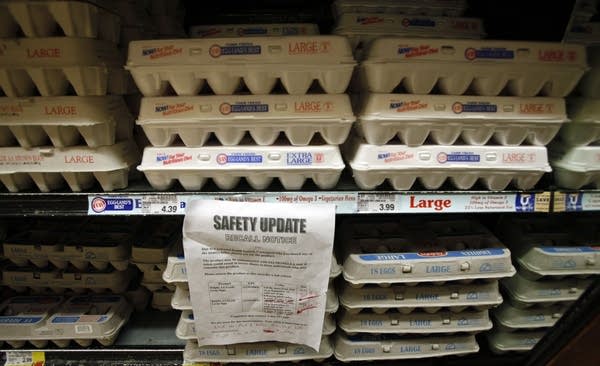Ask Dr. Hallberg: How dangerous is salmonella?
Go Deeper.
Create an account or log in to save stories.
Like this?
Thanks for liking this story! We have added it to a list of your favorite stories.

A recent outbreak of salmonella poisoning has led to the recall of more than half a billion eggs and has renewed concerns about food borne illness.
MPR News medical analyst Dr. Jon Hallberg joined All Things Considered's Tom Crann on Tuesday to provide information about salmonella.
Hallberg is a physician in family medicine at the University of Minnesota and medical director of the Mill City Clinic in Minneapolis.
Tom Crann: What exactly is salmonella?
Turn Up Your Support
MPR News helps you turn down the noise and build shared understanding. Turn up your support for this public resource and keep trusted journalism accessible to all.
Dr. Jon Hallberg: Salmonella is actually the name of a family of bacteria. The one that we're hearing so much about right now is salmonella enteritidis. It likes the gut, so it causes diarrhea.
Crann: What are the symptoms?
Hallberg: It's more than just diarrhea. Many of us have experienced diarrhea or the runs, but this is fever, intense abdominal cramps, and diarrhea.
Crann: How dangerous is it?
Hallberg: Typically this is a self-limited condition. In other words, it takes care of itself. You don't need treatment. You don't need antibiotics. You don't need to be hospitalized. It just burns itself out. That's why we have the diarrhea. It's sort of a way for the body to get rid of the offending bacteria.
But people at both ends of the life spectrum -- infants on the one end and elderly, and nursing home patients on the other -- their immune systems are either sort of immature or they aren't working so well, and also people who have immuno-compromised conditions -- they're getting chemotherapy, or they have HIV/AIDS or something like that. They're all more predisposed to getting serious illness.
Crann: What do you do for it in the clinic if people show up with symptoms?
Hallberg: On the one hand, we might not do much of anything. I may put my public health hat on, and I like to get stool samples of people if it sounds like it might be salmonella. I think it's good for us to track these cases and document them. But as far as treatment, we may not do anything.
If someone's at day three or four already, it's just starting to get better, I think we'll just watch and wait. If they show signs of tachycardia, they have a fast heart rate, they have low blood pressure, they're feverish, they feel miserable, they can't keep fluids down -- that person might even get hospitalized. Some people might receive antibiotics.
Crann: Can it be fatal?
Hallberg: It can be. Thank goodness it's extremely rare that that happens. It's really mind boggling, but they think that maybe one in 50 of us every year in this country get exposed to salmonella. That's six million people, and I know there are not six million documented cases of this. So most of us get it and don't even know it.
Crann: How does salmonella compare to other foodborne illnesses we hear about, things like E. coli?
Hallberg: From a patient perspective, you would probably not feel any different between the two. If it's going to kind of run its self-limited course. E. coli O157 can be extremely deadly in rare, rare situations. We've certainly seen some of that in the news as well, but if you're a patient, it's going to feel just about the same.
Crann: How much can we avoid bugs like this in the food supply. Is it possible to eliminate them?
Hallberg: I know we want to be completely assured that there's absolutely no way we'll ever get exposed to this, but it is simply impossible. When we look at our drinking water, there's a test to look for coliform bacteria -- in other words, sort of E. coli-like bacteria in the water we drink. And there's a certain amount of that that's acceptable, and it's only when you kind of cross that line that it becomes unacceptable and can cause illness.
We all know that food products are allowed a certain amount of insect parts. You just can't avoid it completely. So we have to sort of learn to live with it. And thank goodness our immune systems are typically intact. We are exposed to this. There's a reason why our stomachs have hydrochloric acid in them, to sort of destroy many of the things that we eat so we don't get sick.
Crann: Is there any truth to the (idea that) we need to allow ourselves to be exposed to these things from time to time for our immune systems to work?
Hallberg: I think that's very true. Walking through life is a matter of constant exposure to all kinds of things. There might be proteins from pollen, and so you get exposed to that. We are breathing in things. We're drinking things, eating things. Our immune system is constantly at work. There's never a dull moment. As long as it remains intact, and we're healthy and supporting it and we have proper nutrition, we should be able to get through life, for the most part, just fine.
(Interview transcribed and edited by MPR reporter Madeleine Baran)
Dear reader,
Political debates with family or friends can get heated. But what if there was a way to handle them better?
You can learn how to have civil political conversations with our new e-book!
Download our free e-book, Talking Sense: Have Hard Political Conversations, Better, and learn how to talk without the tension.





